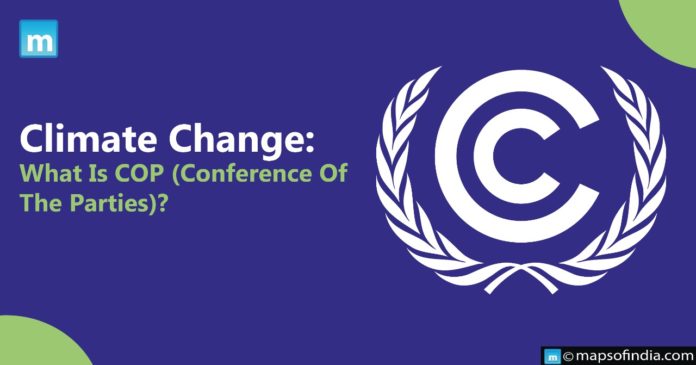COP is a worldwide United Nations summit on climate change that involves the countries dealing with it. COP refers to the Conference of the Parties. The United Kingdom hosted the COP26th from November 6 to November 18 in Scotland’s Glasgow.
To bring greenhouse gas emissions under control and safeguard the earth from climate change, the United Nations Climate Change Framework Convention (UNFCCC) was founded in 1994. It has COP as its supreme-decision making body.
This Framework Convention is a global convention of principle, realising the presence of anthropogenic (human-induced) climate change and providing industrialised countries with a significant part of the responsibility for tackling it. COP meets yearly, and either state parties or a consensus finalises the decisions.
UNFCCC comprises 197 countries as of 2019, and the first conference was held in 1995 in Berlin. However, the significant and impactful conference was in 2015 when the first international climate agreement, COP21, was born in Paris.
Every country (signatory) must publish an action plan of Intended Nationally Determined Contributions showcasing its ambitions to conform with the UNFCCC norms. They agreed to keep below the worldwide average temperature increase of 2° Celsius (3.6° Fahrenheit) above pre-industrial levels.
All 197 signatories are classified into five regional groups: Asia, Africa, Eastern Europe, Latin America and the Caribbean, Western Europe, and Other States (Australia, Canada, and the USA). In addition, various Non-Governmental Organisations (NGOs) also participate in the conferences.
Young climate activist Greta Thunberg spoke at the COP25 summit held in Spain’s Madrid in November 2019. In 2020, the COP was postponed to 2021 due to the coronavirus pandemic. Now, the COP26 included governments, businesses, institutions and financial actors to lead a vigorous and resilient recovery from the novel coronavirus.
India and the UK are contemplating establishing the World Bank for green energy, “which could materialise the proposal for $100 billion climate finance pledged by the developed countries under the Paris Agreement. The UK side requested India’s support for organising a successful COP26,” the union power ministry had said in its statement.
COP26th President Alok Sharma stated the alacrity to partner with India on green hydrogen. It came after Prime Minister Narendra Modi’s speech on the Independence Day of India in 2021, where he proclaimed the National Hydrogen Mission. The statement added, “The UK side was invited to participate in the upcoming bids for Green Hydrogen and lithium-ion.” Segregating water into hydrogen and oxygen leads to the production of Green Hydrogen. An electrolyser is used, backed by electricity from renewable energy sources like wind and solar, which imports 85% of its oil and 53% of gas demand.




